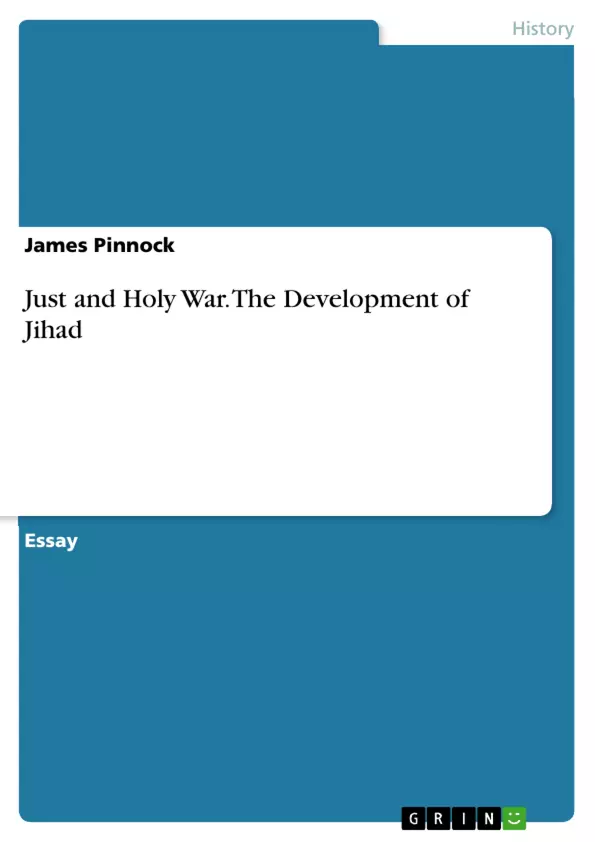This essay focuses on how ideas of jihad developed at the time of the First Crusade, focusing on the Kitab al-Jihab of al-Sulami and the changes in the theory of jihad since the time of the prophet Muhammad and the Ummayad Caliphate.
Inhaltsverzeichnis (Table of Contents)
- How did Muslim ideas of Just and Holy War develop?
- Jihad in the Qur'an and Hadith
- Jihad in the Eighth and Ninth Centuries
- The Dar al-Islam and the Dar al-Harb
- Jihad in the Eleventh and Twelfth Centuries
- Al-Sulami's View of Jihad
- The Role of the Caliphs
- Al-Abiwardi's View of Jihad
- The Greater Jihad
- The Development of Jihad: A Transformation?
Zielsetzung und Themenschwerpunkte (Objectives and Key Themes)
This work examines the evolution of the concept of jihad in Islam, tracing its development from its early roots in the Qur'an and Hadith through to the eleventh and twelfth centuries. It explores how the concept of jihad evolved and adapted to changing political and social realities, focusing on the interplay of religious doctrine and practical implementation.
- The development of the concept of jihad in Islamic law and theology
- The role of the Qur'an and Hadith in shaping early conceptions of jihad
- The influence of Muslim jurists in defining and refining the concept of jihad
- The relationship between jihad and the political landscape of the Muslim world
- The emergence of the greater jihad (al-jihad al-akbar) as a spiritual dimension of jihad
Zusammenfassung der Kapitel (Chapter Summaries)
The text begins by introducing the concept of jihad and its roots in Islamic scriptures. It then explores the development of jihad as a legal theory in the eighth and ninth centuries, highlighting the emphasis on a perpetual state of conflict between the Muslim world (Dar al-Islam) and the non-Muslim world (Dar al-Harb).
The text then shifts to the eleventh and twelfth centuries, analyzing the perspectives of prominent jurists like al-Sulami and al-Abiwardi. It examines their views on the implementation of jihad, particularly in light of the political fragmentation of the Abbasid caliphate.
The final chapter focuses on the transformation of jihad, exploring how its practical implementation evolved from an offensive military campaign to a more nuanced concept. It examines the factors contributing to this shift and the emergence of the greater jihad as a spiritual dimension of jihad.
Schlüsselwörter (Keywords)
This text explores the evolution of jihad in Islamic thought, with particular focus on its legal and theological development, the role of key Muslim jurists, and the impact of political and social contexts. Key terms include jihad, Dar al-Islam, Dar al-Harb, al-jihad al-akbar, al-jihad al-asghar, Muslim jurists, and the Abbasid caliphate.
Frequently Asked Questions
How did the concept of jihad develop during the Crusades?
During the First Crusade, jurists like al-Sulami revived the concept of jihad to mobilize Muslims against the Crusaders, framing it as a necessary defense of the faith and territory.
What is the difference between "Greater" and "Lesser" Jihad?
The "Greater Jihad" (al-jihad al-akbar) refers to the internal spiritual struggle against one's own desires, while the "Lesser Jihad" (al-jihad al-asghar) refers to the external military struggle for the defense of Islam.
What are "Dar al-Islam" and "Dar al-Harb"?
In classical Islamic law, Dar al-Islam (House of Islam) refers to territories under Muslim rule, while Dar al-Harb (House of War) refers to non-Muslim territories, theoretically in a state of conflict with the former.
Who was al-Sulami and why is his work important?
Al-Sulami was a Damascene jurist who wrote "Kitab al-Jihad" in 1105. He was one of the first to call for a unified holy war against the Crusaders, blaming Muslim internal divisions for the Christian success.
How did the role of the Caliphs change regarding jihad?
As the Abbasid Caliphate fragmented, the central authority to declare jihad weakened, leading to local rulers and jurists taking the lead in defining and implementing the holy war.
- Arbeit zitieren
- James Pinnock (Autor:in), 2010, Just and Holy War. The Development of Jihad, München, GRIN Verlag, https://www.grin.com/document/413464



